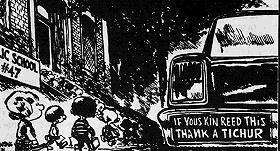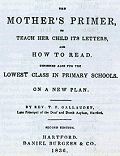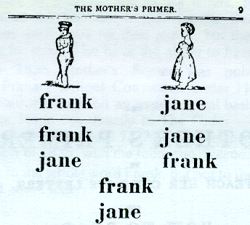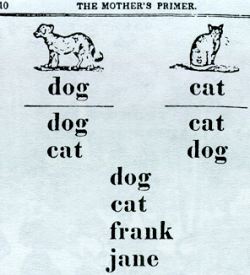 |
|
Skull & Bones Society: How The Order Controls
Education - The Look-Say Reading Method
by Antony C. Sutton
|
This is taken from Antony
C. Sutton's book, America's
Secret Establishment: An Introduction to the Order of Skull & Bones.
How The Order Controls
Education
Memorandum Number Two: The Look-Say
Reading Scam
A tragic failure of American education in this century has been a failure
to teach children how to read and write and how to express themselves in
a literary form. For the educational system this may not be too distressing.
As we shall see later, their prime purpose is not to teach subject matter
but to condition children to live as socially integrated citizen units
in an organic society - a real life enactment of the Hegelian absolute
State. In this State the individual finds freedom only in obedience to
the State, consequently the function of education is to prepare the individual
citizen unit for smooth entry into the organic whole.
However, it is puzzling that the educational system allowed reading
to deteriorate so markedly. It could be that The Order wants the citizen
components of the organic State to be little more than automated order
takers; after all a citizen who cannot read and write is not going to challenge
The Order. But this is surmise. It is not, on the basis of the evidence
presently at hand, a provable proposition.
In any event, the system adopted the look-say method of learning to
read, originally developed for deaf mutes. The system has produced generations
of Americans who are functionally illiterate. Yet, reading is essential
for learning and learning is essential for most occupations. And certainly
those who can read or write lack vocabulary in depth and stylistic skills.
There are, of course, exceptions. This author spent five years teaching
at a State University in the early 1960s and was appalled by the general
inability to write coherent English, yet gratified that some students had
not only evaded the system, acquired vocabulary and writing skills, but
these exceptions had the most skepticism about The Establishment.
The Order comes into adoption of the look-say method directly and indirectly.
Let's start at the beginning.
The Founder Of Deaf Mute Instruction
Look-say reading methods were developed around 1810 for deaf mutes by
a truly remarkable man, Thomas Hopkins Gallaudet. Thomas H. Gallaudet was
the eldest son of Peter Wallace Gallaudet, descended from a French Huguenot
family, and Jane Hopkins. Jane Hopkins traced her ancestry back to John
Hopkins and the Reverend Thomas Hooker in the seventeenth century, who
broke away from the Congregational Church to help found Hartford, Connecticut.
This parallels the story of the Lord family (see Volume One). The Lords
also traced their ancestry back to Hopkins and Hooker and the Lords founded
Hartford, Connecticut. And it was in Hartford, Connecticut in 1835 that
a printer named Lord produced Thomas Gailaudet's first look-say primer,
Mother's Primer.
Gallaudet's original intention was to use the look-say method only for
deaf mutes who have no concept of a spoken language and are therefore unaware
of phonetic sounds for letters. For this purpose, Gailaudet founded the
Hartford
 |
|
School for the Deaf in 1817. The Gailaudet system works
well for deaf mutes, but there is no obvious reason to use it for those
who have the ability to hear sounds.
Anyway, in 1835 Mother's Primer was published and the Massachusetts
Primary School Committee under Horace Mann immediately adopted the book
on an experimental basis. Later we shall find that Horace Mann ties directly
to The Order - in fact, the cofounder, of The Order. On pages 73-74 (see
below) we reproduce two pages from the second edition of 1836, with the |
following directions to the teacher:
". . . pointing to the whole word Frank, but not to the letters. Nothing
is yet to be said about letters. . ."

Click on Picture
for enlarged
view |
|
Why did Horace Mann push a method designed for deaf mutes
onto a school system populated with persons who were not deaf mutes?
There are two possible reasons. The reader can take his or her pick.
First, in 1853 Mann was appointed President of Antioch College. The
most influential Trustee of Antioch College was the co-founder of The Order
- Alphonso Taft.
Second, Mann never had a proper education and consequently was unable
to judge a good method from a bad method for reading. Here's a description
of Mann's school days:
"The opportunities for the lad's schooling were extremely meagre. The
locality enjoyed the reputation of being the smallest school district,
with the poorest school house and the cheapest teacher in the State." |
Mann's teacher was Samuel Barratt and we quote: "in arithmetic he was an
idiot. He could not recite the multiplication table and could not tell
the time of day by the clock ... Six months of the year he was an earnest
and reliable teacher, tasting nothing stronger than tea, then for another
six months he gave himself up to a state of beastly drunkeness . . ."
By 1840 there was a backlash, and the look-say system was dropped in
Massachusetts.
 |
Directions to the Teacher - Say to
the child, pointing to
the first picture, "What is that? Do you know his name?
I wonder if he has a name? Suppose we call him Frank.
O there is his name right under him," pointing to the
whole word, Frank, but not to the letters. Nothing
is
yet to be said about letters. "Here is his name
again.
And here it is again. And here it is once more. What
is that?"," pointing to the other picture. "Perhaps it
is
Frank's sister. What is her name? O here is her name.
It
is Jane. Can you show me her name again? - again -
once more." Repeat till the child can tell the words
readily. |
|
|
 |
Point ot the first picture, "What is that?
Here is the
word dog under the picture. Can you show me the
word dog again? - again - once more? That is Frank's
dog. Well here is Jane's" - (pointing to the second
picture) "What? Can you tell me? What word do you
think that is right under Jane's cat? Can you show me
the word cat again? - again - once more." Pointing
to the word Frank, "What is this?" So with the
word
Jane. Repeat till the words are thoroughly learned. |
|
The Second Attempt
Towards the end of the 19th century The Order came on the scene - and
the look-say method was revived. The youngest son of Thomas Hopkins and
Sophia Gallaudet was Edward Miner Gallaudet. Two of his sons went to Yale
and became members of The Order:
-
Edson Fessenden Gallaudet ('93), who became an instructor of physics at
Yale, and
-
Herbert Draper Gailaudet ('98), who attended Union Theological Seminary
and became a clergyman.
Then the method was adopted by Columbia Teachers' College and the Lincoln
School. The thrust of the new Dewey-inspired system of education was away
from learning and towards preparing a child to be a unit in the organic
society. Look-say was ideal for Deweyites. It skipped one step in the learning
process. It looked "easy," and de-emphasized reading skills.
The educational establishment rationalized look-say be claiming that
up to the turn of the century reading was taught by "synthetic" methods,
i.e., children were taught letters and an associated sound value. Then
they learned to join syllables to make words. This was held to be uninteresting
and artificial. Educational research, it was claimed, demonstrated that
in reading words are not analyzed into component letter parts but seen
as complete units. Therefore, learning to read should start with complete
units.
Education
Of course, there is a gigantic nonsequitur in this reasoning process.
Certainly a skilled reader does see words as complete units. And a really
skilled reader does see lines and paragraphs at a glance. But the accuracy
of perceiving the whole is based on the degree of understanding and knowledge
of the component parts.
The educational establishment argues today in the 1980s that, based
on further experimental testing, it is easier for a child to read the line
"the rocket zoomed into space" than "the cat sat on the mat." The first
line has "constrasting visual structure" and the second quote has a "similar
visual pattern."
What they have done now is to make a mountain out of a molehill, convert
the relatively simple task of learning to read into an unnecessarily complex
system.
Why? That we shall see as the story progresses.
 |
| The visual patterns of words in two sentences |
How children are taught to read - and why they can't.
| Again, it is amazing how dull and fascinated with meaningless complex
details the "professional educational psychologists" are. It takes about
15 minutes of reading all about this and some familiarity with phonics
to understand what they are doing wrong and what should be done.
Yes, adults do read words as "whole words", but that is long after they
have learned to read, and have contacted each words thousands of times.
Through repetition, the words are seen and recognized instantly. But for
learning word recognition, and meaning, it is best to employ phonics,
where the child learns to sound out basic word sounds of the English language
(there's less than 50 to learn). Once the child learns the system, which
any child can learn, it is simple to sound out every new word he encounters.
This skill stays with the child his entire life. Repetition is also used,
and as the child contacts the same word over and over, he comes to become
familiar with it and recognize it. He gradually and automatically learns
to associate the shape of the word and letters, with the sound of the word
and the meaning of the word. It is not based upon memorization.
The look-say method depends upon memorization, and gives the child no
way to learn how to pronounce any word he hasn't earlier memorized. This
puts an incredible limit on his future vocabulary. Children taught on this
method often have eyes which dart all over the page - from their earlier
attempts to look fpr and find pictures which tell them what the word refers to and means. This
acts as an actual distraction to reading and comprehension.
That so many people, with so much money, can come up with such ludicrous
and unsuccessful study techniques is mind-boggling. Either they never intended
to solve the problems they were addressing, or they were (are) truly dumb
people - pretending to be experts and authorities when they actually were (are)
not. Part of the problem, I believe, is that they take themselves and their complex ideas much too seriously - with harmful results for the rest of us. They would rather conceive themselves to be "right" and have the world falling apart at it's seams, that admit their severe errors and let the world possibly become a decent place. |
Get The Book!
America's
Secret Establishment: An Introduction to the Order of Skull & Bones
by Antony C. Sutton - the complete book with more details & facts about
the hidden forces behind modern public education, psychology, economics,
politics and world chaos. Covers Yale University's link to a secret German
society, the Bush Family (i.e. George), and much more. Very well reserached
and written.
Suggested Reading List - the Demise of
the Educational System - OBE (Outcome-Based Education), NEA (National
Education Association), educational psychology, German psychology &
influences, demise of public education, educational sabotage, Wundt, Pavlov,
Dewey, Skinner, Watson.
Say NO
To Psychiatry!
Back to Look-See Main Page
Back to Education Main Page
Back to Main SNTP Page
|
 |
|
 |
| Pursuing
Truth in all subjects... |
|
| ©Gene Zimmer 1999 ALL RIGHTS RESERVED |
|
|







